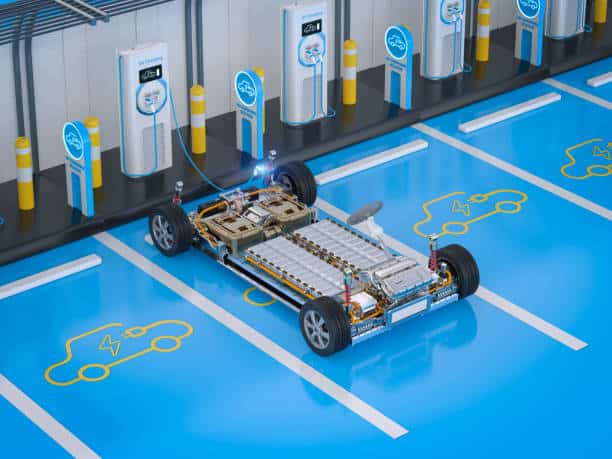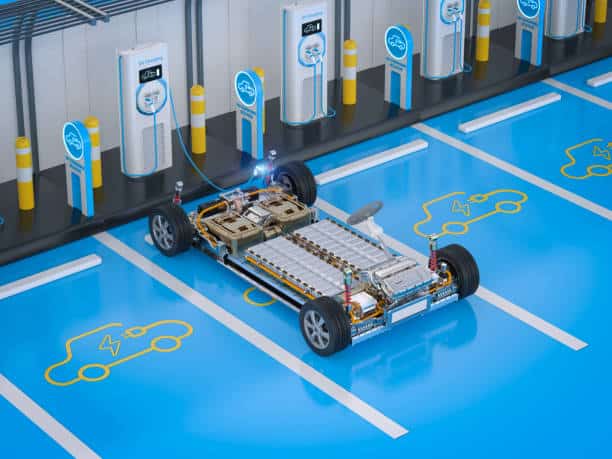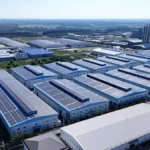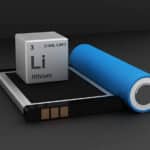
The MC33771C serves as a 14-channel battery cell controller IC that enables advanced monitoring, balancing, and data communication within electric vehicle battery packs. As a smart battery management IC for EV applications, it plays a key role in supporting safe and efficient operation. The EV BMS CAN controller MC33771C addresses the growing needs of Vietnam’s electric motorbike, solar energy storage, and battery swapping markets. With local EV production rising and the energy storage system market expanding, this IC supports reliable battery management in both residential and commercial sectors.
Key Takeaways
-
The MC33771C controller safely monitors and balances up to 14 battery cells, helping extend battery life and prevent damage.
-
It uses fast CAN communication to share real-time data, enabling smart control and reliable operation in electric vehicles and energy storage.
-
The device supports popular lithium-ion batteries like LiFePO4 and NMC, making it versatile for various EV and solar applications.
-
Its scalable design lets engineers connect many controllers in a chain, allowing management of large battery packs for different vehicle sizes.
-
Vietnamese manufacturers use the MC33771C to build safer, longer-lasting batteries for electric motorbikes, solar storage, and battery swapping stations.
MC33771C Overview
Key Features
The MC33771C stands out as a highly integrated battery cell controller. It manages up to 14 battery cells in series, making it ideal for electric vehicles and energy storage systems. This device offers advanced monitoring and protection features that help keep battery packs safe and efficient.
-
🛡️ Robust Safety Protections: The controller monitors cell voltages and temperatures. It provides under-voltage, over-voltage, and over-temperature protection for each cell.
-
🔄 Active Cell Balancing: The MC33771C supports both passive and active cell balancing. This feature helps extend battery life and maintain consistent performance.
-
⚡ Flexible Communication: The device uses a high-speed CAN interface. This allows fast and reliable data exchange between the battery pack and the main vehicle controller.
-
🧩 Scalable Design: Engineers can connect multiple MC33771C devices in a daisy-chain. This makes it easy to build large battery systems for different vehicle sizes.
-
🛠️ Automotive-Qualified: The controller meets strict automotive standards. It works well in harsh environments found in electric vehicles.
Note: The EV BMS CAN controller MC33771C helps manufacturers design safer and more reliable battery packs for electric vehicles and energy storage.
Supported Chemistries
The MC33771C supports a wide range of lithium-ion battery chemistries. It works with both LiFePO4 (Lithium Iron Phosphate) and NMC (Nickel Manganese Cobalt Oxide) cells. These chemistries are popular in electric vehicles, solar energy storage, and battery swapping systems.
|
Supported Chemistry |
Typical Application |
|---|---|
|
Li-Ion (NMC) |
Electric cars, motorbikes, ESS |
|
LiFePO4 |
Solar storage, e-mobility, UPS |
The controller manages between 7 and 14 lithium-ion cells in series. It provides essential protections such as voltage and temperature monitoring. This makes it suitable for demanding automotive and industrial applications. The MC33771C also finds use in hybrid electric vehicles, uninterruptible power supplies, and large-scale energy storage systems.
EV BMS CAN Controller MC33771C Functions
Cell Monitoring
The EV BMS CAN controller MC33771C plays a vital role in monitoring battery cells. It measures the voltage of each cell in real time. This helps detect any cell that may become overcharged or deeply discharged. The MC33771C can monitor up to 14 individual battery cells with a single IC. This feature allows engineers to design battery packs with precise control and safety. The controller also tracks cell temperatures. High temperatures can damage batteries or cause safety risks. By monitoring both voltage and temperature, the MC33771C helps prevent dangerous situations and extends battery life.
Tip: Accurate cell monitoring helps avoid costly battery failures and improves the reliability of electric vehicles.
Cell Balancing
Cell balancing keeps all battery cells at similar voltage levels. The EV BMS CAN controller MC33771C supports both passive and active balancing methods. Passive balancing removes extra energy from higher-voltage cells as heat. Active balancing moves energy from stronger cells to weaker ones. This process helps every cell work together and prevents one cell from wearing out faster than others. Balanced cells deliver more power and last longer. The MC33771C manages this process automatically, so users do not need to worry about uneven charging or discharging.
-
Benefits of cell balancing with MC33771C:
-
Increases battery pack lifespan
-
Maintains consistent performance
-
Reduces maintenance needs
-
CAN Communication
Communication is essential for modern battery management systems. The EV BMS CAN controller MC33771C uses a high-speed CAN interface to share data between the battery pack and the main vehicle controller. CAN stands for Controller Area Network. This network allows fast and secure data transfer. The MC33771C sends information about cell voltages, temperatures, and balancing status. The main controller can then make smart decisions about charging, discharging, and safety actions. Multiple MC33771C devices can connect in a daisy-chain to manage large battery systems. This setup supports electric vehicles, solar storage, and battery swapping stations.
Note: Reliable CAN communication ensures that every part of the battery system works together for safe and efficient operation.
Use Cases in Vietnam

Electric Motorbikes & Scooters
Vietnam’s electric motorbike and scooter market is growing quickly. Local brands like VinFast, Dat Bike, and Pega focus on safety, long battery life, and reliable performance. The EV BMS CAN controller MC33771C helps these manufacturers build battery packs that meet these needs. It monitors each cell’s voltage and temperature, which helps prevent overcharging and overheating. The controller also balances the cells, so every battery delivers consistent power. This technology supports daily commuting and delivery services, where vehicles need to run safely and efficiently in busy cities.
Tip: Reliable cell monitoring and balancing help extend battery life and reduce maintenance for electric motorbikes.
Solar Energy Storage
Solar energy storage systems are becoming more common in homes and businesses across Vietnam. The MC33771C improves the reliability and efficiency of these systems. It provides accurate measurements of voltage, current, and temperature for each battery cell. The controller includes passive cell balancing and advanced diagnostics, which help prevent faults like over-voltage or over-temperature. Its isolated daisy chain communication allows for easy expansion of large battery packs. The MC33771C meets ISO 26262 safety standards up to ASIL D, which ensures high safety and long battery life. Its automotive-grade quality makes it suitable for both residential and industrial solar projects.
Battery Swapping
Battery swapping stations are popular in Vietnam’s urban areas. These stations need battery packs that are safe, modular, and easy to manage. The MC33771C meets these requirements with features such as high scalability, fast response time, and robust communication. The table below shows how the controller addresses key needs for battery swapping systems:
|
Key Requirement Aspect |
MC33771C Feature Description |
|---|---|
|
Scalability |
Supports 4 to 210 cells per daisy chain; up to 63 nodes in a single daisy chain |
|
Safety and Functional Safety |
ASIL C capable, easy ASIL D compliance; >40 integrated safety mechanisms; ISO 26262 standard |
|
Measurement Accuracy |
±0.8 mV total voltage error after aging; ±0.5% stack voltage and current sensor accuracy |
|
Communication |
4.0 Mbps SPI or isolated 2.0 Mbps differential communication; supports inductive/capacitive coupling |
|
Battery Management Features |
Integrated passive balancing (300 mA per channel); on-chip current sensor and coulomb counter |
|
Environmental Robustness |
-40°C to 105°C operation; ESD, EMC, Hot Plug, AEC-Q100 compliant |
|
Response Time |
<546 microseconds conversion time for all cells |
The controller’s advanced diagnostics and automotive qualification help ensure safe and reliable operation. This makes battery swapping faster and more convenient for users in Vietnam’s cities.
Integration and Benefits
System Integration
Engineers can integrate the EV BMS CAN controller MC33771C into electric vehicle and energy storage systems with ease. The hardware supports 7 to 14 battery cells per device, making it flexible for different pack sizes. Designers can connect up to 63 devices in a daisy chain, with each node spaced up to 20 meters apart. This setup allows for large battery systems in buses, trucks, or solar storage.
Key hardware features include:
-
Integrated passive balancing up to 300 mA per channel
-
On-chip current sensor and coulomb counter for precise current measurement
-
Multiple communication options, such as 4.0 Mbps SPI and isolated 2.0 Mbps differential links
-
Automotive-grade robustness, including ESD protection, EMC compliance, and Hot Plug capability
Software tools also support smooth integration. NXP provides Analog Expert drivers, which work with S32K144 and other microcontrollers. These drivers help with initialization, register access, diagnostics, and temperature calculations. Evaluation boards and GUI tools, like S32K144EVB and RD33771CDSTEVB, make development and testing faster. The software supports TPL communication for daisy chain management and offers reference designs for AutoSAR environments.
Tip: Pin and package compatibility with earlier versions lets engineers reuse existing PCB layouts, saving time and cost.
Safety and Efficiency
The MC33771C enhances safety and efficiency in every battery system. It measures both stack and individual cell voltages with high accuracy. This helps prevent unsafe conditions, such as overcharging or deep discharge. The controller also tracks charge and discharge currents up to 30 A DC, supporting reliable current monitoring.
The device balances cells during charging, which keeps voltage levels uniform and extends battery life. Communication features, like compatibility with MC33665A Battery Gateway and TPL Transceivers, ensure synchronized message handling. These features support fast, reliable data transfer and help maintain system integrity.
-
Accurate voltage and current measurement
-
Message buffering and synchronization for data integrity
-
Compliance with ISO 26262 for functional safety
These benefits make the MC33771C a trusted choice for automotive and industrial battery management. The controller helps manufacturers deliver safe, long-lasting, and efficient battery packs for electric vehicles and energy storage.
The MC33771C delivers reliable safety, scalability, and performance for battery management in electric vehicles and energy storage. Its advanced features—such as authenticated sensor data, NFC-based security, and flexible daisy-chain communication—help prevent hazards and support system expansion. Manufacturers in Vietnam value its high-accuracy measurements, robust diagnostics, and automotive-grade safety. These strengths make the MC33771C a trusted choice for building efficient, long-lasting battery systems in the growing EV and renewable energy sectors.
What battery chemistries does the MC33771C support?
The MC33771C works with popular lithium-ion chemistries, including LiFePO4 and NMC. These types appear in electric vehicles, solar energy storage, and battery swapping systems.
How does the MC33771C improve battery safety?
The MC33771C monitors cell voltage and temperature. It provides over-voltage, under-voltage, and over-temperature protection. These features help prevent battery failures and increase system safety.
Can engineers use the MC33771C for large battery packs?
Yes. Engineers can connect up to 63 MC33771C devices in a daisy chain. This setup manages large battery systems for buses, trucks, or solar storage.
What communication options does the MC33771C offer?
|
Interface |
Speed |
Use Case |
|---|---|---|
|
CAN |
High-speed |
Vehicle data exchange |
|
SPI |
4.0 Mbps |
Fast internal communication |
|
TPL |
Isolated |
Daisy-chain management |
Is the MC33771C suitable for Vietnam’s EV market?
The MC33771C meets automotive standards and supports local needs for safety, modularity, and reliable communication. Vietnamese manufacturers use it in electric motorbikes, solar ESS, and battery swapping stations.
See Also
Enhancing Automotive Performance Using NXP MC9S12X Series
A Detailed Look At MC9S12DJ256MFUE Automotive Specs
Three Key Features Of SPC5605BMLL6 And SPC5607BMLL6 ECUs
Simplifying Engine Control With SPC56 Microcontroller Technology
Unveiling The Main Automotive Benefits Of FREESCALE MCF5251CVM140


